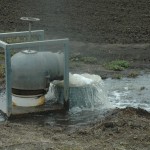Free testing for private water wells after Hurricane Harvey
Contacts: Diane Boellstorff, 979-458-3562, [email protected]
Drew Gholson, 979-845-1461, [email protected]
VICTORIA — Private water well owners whose wells flooded from the recent rains should assume their well water is contaminated until tested, according to Dr. Diane Boellstorff, Texas A&M AgriLife Extension Service water resource specialist, College Station.
“You should not use water from a flooded well for drinking, cooking, making ice, brushing your teeth or even bathing until you are satisfied it is not contaminated,” Boellstorff said.
Residents who want to have their well water tested should pick up a free water sampling test kit at the temporary office of AgriLife Extension in Victoria County, located at 259 Bachelor Dr. in Victoria. Instructions will be included with the kits, and well owners must be available to pick up the sample kit, take the sample and return it to the office — all on Sept. 21 from 8 – 11a.m.
Boellstorff, who is in Texas A&M University’s soil and crop sciences department, said floodwater may contain substances from upstream, such as manure, sewage from flooded septic systems or wastewater treatment plants or other contaminants. A septic system near a well also can cause contamination when the soil is flooded.
AgriLife Extension, Virginia Tech and the Rural Community Assistance Program are offering free well water testing to private well users who were affected by Hurricane Harvey as a means to improve understanding of a flood’s impact on private well waters and to enhance communications on well water quality.

Test kits will be distributed in several locations, but any homeowner with a private water well in the flood-affected area is eligible. There are a limited number of kits, which will be distributed on a first-come, first-served basis. The samples will be analyzed for coliform bacteria by Virginia Tech. Water quality results will be confidential and will be emailed or mailed to residents’ homes.
Instructions for decontaminating a well are available through the following publications free for download at http://twon.tamu.edu/fact-sheets/: Decontaminating Flooded Water Wells and Shock Chlorination of Wells.
Drew Gholson, AgriLife Extension program specialist and network coordinator, College Station, said after a flood wells should be inspected for physical damage and signs of leakage.
“If it appears damaged, consult a licensed water well contractor to determine whether repairs are needed,” Gholson said.
He also noted flooding can damage the well pump and electrical systems.
“If the pump and/or electrical system has been underwater and it is not designed to be under water, do not turn on the pump as there is a potential for electrical shock or damage to your well or pump,” he said.
Gholson said once floodwaters have receded and pump and electrical system have dried, have a qualified electrician, well driller or pump installer check the wiring system and other well components.


